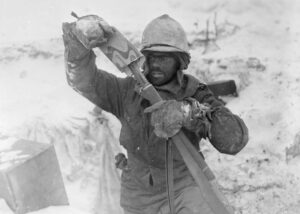GEN Bruce Palmer, Jr., one of the most important U.S. Army commanders of the Vietnam War and one of three founders of the Army Historical Foundation, died on 10 October, 2000 in Alexandria, VA, after a stroke. He was 87.
GEN Palmer was born 13 April 1913 in Austin, TX, into a family with a long Army legacy. His grandfather won a Medal of Honor during the Civil War and his father reached the rank of brigadier general.
Palmer graduated sixth in his class from West Point in 1936 and was commissioned a second lieutenant in the cavalry. His first assignment was with the 8th Cavalry at Fort Bliss, TX. That same year he married Kay Sibert.
During the early part of World War II, Palmer was assigned to the 6th Cavalry (Mechanized) at Fort Riley, KS. He was later assigned to the Operations Division of the War Department General Staff. After a temporary promotion to lieutenant colonel in 1943, Palmer served as Chief of Staff for the 6th Infantry Division, which participated in the New Guinea and Luzon campaigns.
After the war, Palmer received a temporary promotion to colonel and commanded the 63rd Infantry during the occupation of Korea. From 1947 until 1949, he served as chief of plans and operations of the First Army. In 1949, he became an instructor of tactics at the Infantry School at Fort Benning.
After his graduation from the Army War College in 1952, GEN Palmer served in a variety of assignments during the 1950s, including commander of the 16th Infantry (1954-55); deputy secretary of the General Staff and White House liaison officer, Office of the Chief of Staff (1957-59). He also served on the faculty of the Army War College and later served as its deputy commandant (1959-61).
In 1961, GEN Palmer was appointed assistant division commander of the 82nd Airborne Division. The following year, GEN Palmer was named as chief of staff of Eighth Army in Korea.
After his assignment with Eighth Army and various tours on the Army staff, GEN Palmer was given command of Task Force 120 and U.S. Land Forces, Dominican Republic, during the U.S. intervention in that Caribbean nation from May 1965 to January 1966. After the Dominican intervention, GEN Palmer was then appointed commander of the XVIII Airborne Corps at Fort Bragg, NC.
During the Vietnam War, GEN Palmer commanded II Field Force, the largest U.S. Army combat command in Vietnam, from March to July 1967. During his tenure as commander, the II Field Force conducted Operations Junction City and Manhattan, the two largest operations of the war to that time. From July 1967 to June 1968, GEN Palmer served as the deputy commander of U.S. Army, Vietnam (USARV). Although GEN William Westmoreland, commander of Military Assistance Command, Vietnam (MACV) also held the title of USARV commander, the USARV deputy commander actually ran the Army’s day-to-day operations.
After his promotion to general in 1968, GEN Palmer was named vice chief of staff from August 1968 to June 1972. He served as acting chief of staff from June to October 1972 when the confirmation of chief of staff appointee GEN Creighton W. Abrams, Jr., was delayed by Senate hearings investigating allegations that U.S. commanders in Vietnam exceeded their authority. From 1972 until his retirement in 1974, GEN Palmer commanded Army Readiness Command at MacDill AFB, FL. During his long and distinguished career, GEN Palmer earned five Army Distinguished Service Medals, an Air Force Distinguished Service Medal, a Silver Star, Legion of Merit, Bronze Star, and Air Medal. He also held the Director of Central Intelligence’s National Intelligence Distinguished Service Medal.
During his retirement, GEN Palmer was named executive director of the Defense Manpower Commission, which studied the transition to an all-volunteer force. He also served as a member of the CIA’ s military review panel.
In 1984, GEN Palmer’s book, The 25-Year War: America’s Military Role in Vietnam, one of the most important books on the war, was published. In the book, Palmer criticized the American handling of the war, stating that the U.S. placed too much emphasis on air power and declared that U.S. military leaders “must share the onus of failure.” GEN Palmer also wrote Intervention in the Caribbean: The Dominican Crisis of 1965, which detailed the U.S. intervention in the Dominican Republic.
As a strong supporter of Army history, GEN Palmer, along with GEN Lyman L. Lemnitzer, USA-Ret., and LTG Orwin C. Talbott, USA-Ret., founded the Army Historical Foundation in 1983. The Foundation was established to support the creation of a national Army museum, to support the refurbishing of Army historic buildings, promote scholarly research into the Army’s past, and in general, to support programs that preserve and promote the history of the U.S. Army.





